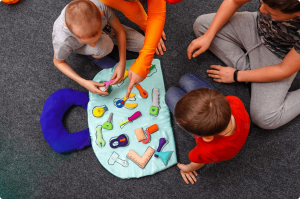Can activities using sensory toys be beneficial for children with autism? The answer is yes.
The effects of autism during childhood – such as social isolation and trouble communicating – may get in the way of a child’s ability to learn, interact with others, follow instructions, and understand certain concepts. With that in mind, activities that engage the five senses in the improvement of cognitive skills are ideal for proper development.
Sensory activities can benefit children with autism in a number of ways, by:
- Providing relief to stimuli sensitivity resulting from Sensory Processing Disorder (SPD).
- Creating and strengthening neural pathways in the brain.
- Improving the use of small muscles of the hands and fingers, known as fine motor skills.
- Enhancing communication abilities and social interactions through group play.
- Helping children stay more focused and calm.
Now that you know how sensory activities can contribute to your little one’s growth, the question becomes: which activities should you focus on?
Because there’s a range of different sensory toys and activities for kids of all ages, it can be hard to choose just a few. Hopefully, you’ll get some inspiration from the following:
- Fidgeting toys. Because they’re great for popping, squishing, and fidgeting with, they can help in easing anxiety. The more colourful the toy is, the better it will be at holding a child’s attention. Great examples would be popping toys and busy cubes.
- Guess That Smell games. This type of game is awesome for teaching children to identify different smells. Ideally, you would put foods with distinct smells inside several jars – such as coffee, crackers, and ketchup. While the child is blindfolded, they would try and describe each smell.
- Listening walks. This activity doubles as a relaxing walk through the neighborhood. Take your little one for a walk, and ask them to be attentive to the different sounds they might be hearing along the way. If possible, ask them to describe the sounds, and tell you which ones they like or don’t like.
- Memory games. This one is simple to perform. Place a few objects on a tray, and ask the child to pay close attention to them. Next, remove the items and ask the child to remember the names of as many objects as they can.
- Blind taste test. Pick out salty, sweet, sour, and bitter foods for this activity. While the child is blindfolded, ask them to try and identify the food they’re consuming, as well as how it tastes.
It’s a good idea to include as many sensory activities in children’s routine as possible. This way, they’ll be exploring their five senses more and more each day.





